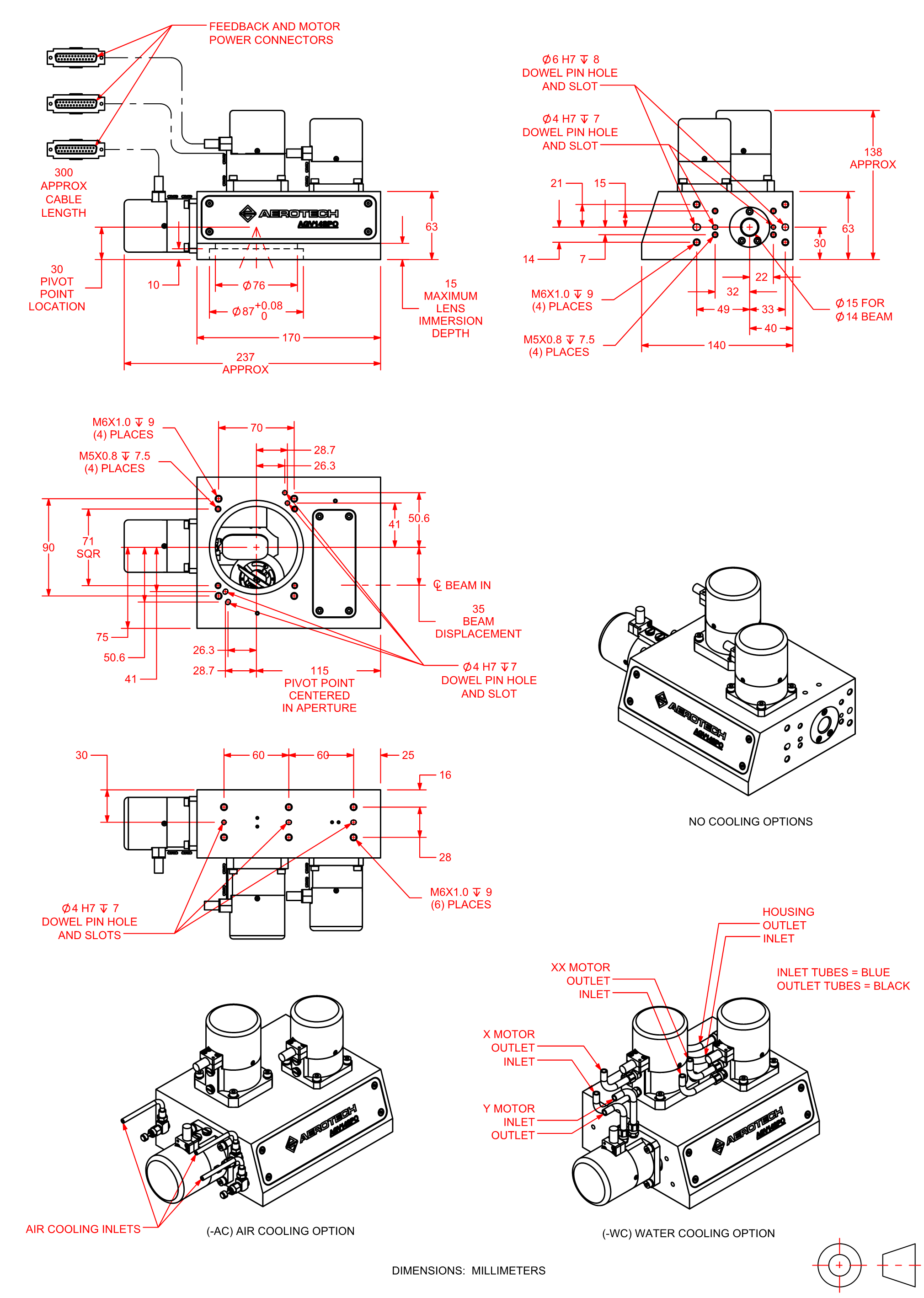AGV-SPO High-Performance Single Pivot-Point Laser Scan Heads
Aerotech’s AGV-SPO single pivot-point galvanometer scanner provides an alternative to traditional two-mirror galvo scanners. Derived from the popular AGV-HPO scanner, the AGV-SPO enables a larger field of view and reduced spot distortion for critical laser micromachining applications.
Description
Specifications
Dimensions
Ordering Info
Downloads
Description
Description
Specifications
Dimensions
Ordering Info
Downloads
Description
Design Features
- Larger field of view than traditional 2D scanners simplifies the processing of larger parts
- Minimal spot distortion over the entire field of view minimizes processing variation for the highest quality laser-processed parts
- Air and water cooling options provide thermal stability and improve long-term accuracy
- Many choices of mirror surface treatments for a variety of laser wavelengths
Large Field of View with Minimal Spot Distortion
A unique optical design effectively controls the beam entrance pupil to be coincident for the X and Y scanner motion, increasing the effective numerical aperture of the scanner system. This design directly enables a larger field of view for a given focal length and reduces spot distortion over the entire working area. These advantages mean that the AGV-SPO is able to process larger parts faster and with greater consistency.
Design Configurations
The AGV-SPO is available with a selection of optical coatings and focusing optics to support a variety of commonly-used laser wavelengths and focal lengths. To support other needs, Aerotech can supply the AGV-SPO with customized optics and optical mounting features upon request. The AGV-SPO can be configured with air-cooled mirrors, water-cooled motors, or both. These active cooling features help to preserve working-plane accuracy in the presence of thermal disturbances caused by the laser as well as aggressive motion profiles.
Advanced Programming Features
The AGV-SPO utilizes all of Aerotech’s advanced motion and Position Synchronized Output (PSO) capabilities that have been developed for laser processing applications with traditional galvos and servo stages. Contouring functions such as Acceleration Limiting can be used to automatically reduce speeds in tight corners or small radii to minimize overshoot. The laser can be triggered based on the position feedback of the mirrors with PSO to ensure consistent spot overlap as the scanner changes speed.
Aerotech’s Infinite Field of View (IFOV) function seamlessly combines servo and scanner motion to extend the marking capability of the scanner across the entire travel range of the servo stages, eliminating stitching errors that can occur in a more traditional move-expose-repeat process.
Ordering Information
Wavelength of Mirror Coating (Required)
| Option | Description |
| -W001 | 10.6 um wavelength coating |
| -W004 | 1064 nm wavelength coating |
| -W006 | 532 nm wavelength coating |
| -W008 | 355 nm wavelength coating |
| -W009 | 343 nm wavelength coating |
- Other wavelengths available; inquire with factory.
F-Theta Lens (Optional)
| Option | Description |
| -Lxx | A variety of F-Theta lenses with different focal length and wavelength combinations are available; inquire with factory |
Air Cooling (Optional)
| Option | Description |
| -AC | Air cooling |
Water Cooling (Optional)
| Option | Description |
| -WC | Water cooling |
Integration (Required)
Aerotech offers both standard and custom integration services to help you get your system fully operational as quickly as possible. The following standard integration options are available for this system. Please consult Aerotech if you are unsure what level of integration is required, or if you desire custom integration support with your system.
| Option | Description |
| -TAS | Integration - Test as system Testing, integration, and documentation of a group of components as a complete system that will be used together (ex: drive, controller, and stage). This includes parameter file generation, system tuning, and documentation of the system configuration. |
| -TAC | Integration - Test as components Testing and integration of individual items as discrete components that ship together. This is typically used for spare parts, replacement parts, or items that will not be used together. These components may or may not be part of a larger system. |


